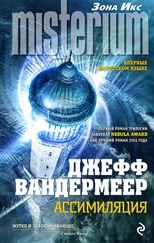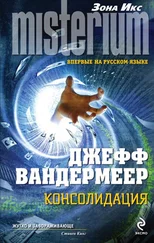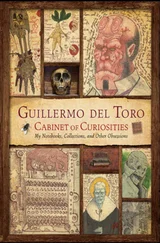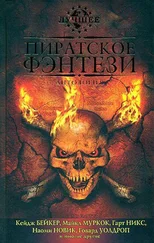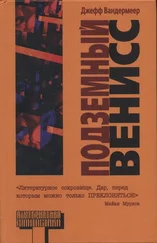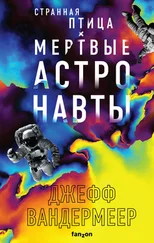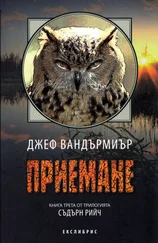Джефф Вандермеер - The Thackery T. Lambshead Cabinet of Curiosities
Здесь есть возможность читать онлайн «Джефф Вандермеер - The Thackery T. Lambshead Cabinet of Curiosities» весь текст электронной книги совершенно бесплатно (целиком полную версию без сокращений). В некоторых случаях можно слушать аудио, скачать через торрент в формате fb2 и присутствует краткое содержание. Жанр: Фэнтези, на английском языке. Описание произведения, (предисловие) а так же отзывы посетителей доступны на портале библиотеки ЛибКат.
- Название:The Thackery T. Lambshead Cabinet of Curiosities
- Автор:
- Жанр:
- Год:неизвестен
- ISBN:нет данных
- Рейтинг книги:5 / 5. Голосов: 1
-
Избранное:Добавить в избранное
- Отзывы:
-
Ваша оценка:
- 100
- 1
- 2
- 3
- 4
- 5
The Thackery T. Lambshead Cabinet of Curiosities: краткое содержание, описание и аннотация
Предлагаем к чтению аннотацию, описание, краткое содержание или предисловие (зависит от того, что написал сам автор книги «The Thackery T. Lambshead Cabinet of Curiosities»). Если вы не нашли необходимую информацию о книге — напишите в комментариях, мы постараемся отыскать её.
The Thackery T. Lambshead Cabinet of Curiosities — читать онлайн бесплатно полную книгу (весь текст) целиком
Ниже представлен текст книги, разбитый по страницам. Система сохранения места последней прочитанной страницы, позволяет с удобством читать онлайн бесплатно книгу «The Thackery T. Lambshead Cabinet of Curiosities», без необходимости каждый раз заново искать на чём Вы остановились. Поставьте закладку, и сможете в любой момент перейти на страницу, на которой закончили чтение.
Интервал:
Закладка:
“Too late for that, Missy,” the crouched thing with the key says. I don’t look at it. I can’t bear the thought of ever setting eyes on it again.
“Daresay, took you long enough to puzzle it out. Been waiting here so long I’ve memorized the names of all the crayfish, and I think I might be waterlogged.”
“I don’t want to see any more,” I say, and it laughs at me. Or maybe it doesn’t laugh at me, but it laughs. It’s a small laugh, very small, and the sound makes me think of burning paper.
“Best be minding your P’s and Q’s, Missy. Come too far to go lily-livered on us now, don’t you reckon?”
And I hear a clattering noise that I know is the crouched thing fitting the skeleton key into the keyhole in the granite wall. And I’m thinking how all this is wrong, that I should be at the keyhole, that the women should be with me, when the granite wall swings open wide, and the barnacles scream, and . . .
Excerpt from Darkening Horizons: The American Supernatural Novel During the 1980s by Gerald Hopkins (Austin: University of Texas Press, 1993):
. . . and, regrettably, the unjustly celebrated “Evil God, Out of Words” ( Twilight Zone magazine #8, November 1981) isn’t much better than Chalmers’s earlier attempts to update the weird tale. Like Klein’s The Ceremonies, this story adopts the basic framework and themes of Arthur Machen’s “The White People”—a loss of innocence and the corruption of the untainted by way of induction into a secret witch cult—but does so far less effectively than Klein’s revisiting of Machen’s premise. And, to make matters worse, somehow, Chalmers has managed to write a story of only some eight thousand or so words that seems to go on forever, heedless of its size, not unlike the cursed real estate of Joseph Payne Brennan’s “Canavan’s Backyard.”
The genesis of “Evil God, Out of Words” proves a good deal more intriguing than the story itself:
The entire plot coalesced indirectly around a single childhood memory, something I saw when I was ten years old. This would have been 1946 or ’47. My mother and I accompanied my father on a business trip to Paris. We rarely took proper vacations, and I think he was trying to make up for that. Anyway, we saw the usual sights one sees in Paris, but we also visited a natural history museum, which delighted me far more than all the Eiffel Towers and Arcs de Triomphe combined. There was an enormous Victorian gallery filled with dinosaur skeletons! For a ten-year-old boy, how could the Louvre ever possibly hope to compete with Diplodocus, Allosaurus, and Iguanodon ? Of course, though, none of these served as the story’s inspiration. But there was also a small glass case containing a sort of mummified hand, and the hand was gripping an old-fashioned key. I believe it was an Egyptian artifact of some sort, and it seemed entirely out of place there among the dinosaurs and mastodons. Perhaps this is why I recall it so clearly. The fingers had hooked nails or talons, and it reminded me immediately of W. W. Jacobs’s “The Monkey’s Paw,” which I’d read by then, naturally. The odd thing is, decades later, I wrote the museum to inquire about the hand, wishing to compare my memories with the reality of what I’d seen. I received a somewhat terse response to the effect that there had never been any such artifact displayed at the museum. Now, I knew better. I’d seen it with my own eyes, hadn’t I? I wrote a second time, and they didn’t even bother to answer me. But what’s important here is that it set me on the path leading to “Evil God, Out of Words.”
Though the relic Chalmers may or may not have seen while in Paris as a child doesn’t appear in the story, it is plainly echoed in the recurring motif of keys, both literal and figurative. Most notably, the terrible old man who first speaks to the story’s l’enfant innocent of “the mysteries of the worm” describes nine magical keys. Each key bears the name of one of the muses of Greek mythology, as set forth in Cesare Ripa’s Iconologia (1593). The old man tells the girl that the two most powerful keys, Polyhymnia and Calliope, are required for the ritual of resurrection (“shredding the veil, casting back, fetching up”). If Chalmers’s choice of these two muses is meant to hold a particular symbolic meaning, it escapes repeated . . .
Excerpt from “The Thousand and Third Tale of Scheherazade: A Survey of the Arabian Ghûl in Popular Culture,” Esther Kensky, The Journal of Popular Culture, vol. 42, no. 6 (December 2009):
. . . will, instead, quote at length from the summary provided by Niederhausen and Flaschka (1992): “This was the time before the war between the Ghûl (plural, Arabic  and the other races of the Djinn
and the other races of the Djinn  —the Ifrit, the Sila, and the Marid. In those days, the men of the desert still looked upon all the Djinn as gods, though they’d already learned to fear the night shades, the Ghûl, and guarded their children and the graves of their dead against them. Among the fates that could befall the soul of a man or woman, to have one’s corpse stolen and then devoured by the Ghûl was counted as one of the most gruesome and tragic conceivable. It was thought that to be so consumed would mean that the deceased would be taken from the cold sleep of barzakh, never to meet with the angels Nakir and Munkar, and so never be interrogated and prepared for Paradise
—the Ifrit, the Sila, and the Marid. In those days, the men of the desert still looked upon all the Djinn as gods, though they’d already learned to fear the night shades, the Ghûl, and guarded their children and the graves of their dead against them. Among the fates that could befall the soul of a man or woman, to have one’s corpse stolen and then devoured by the Ghûl was counted as one of the most gruesome and tragic conceivable. It was thought that to be so consumed would mean that the deceased would be taken from the cold sleep of barzakh, never to meet with the angels Nakir and Munkar, and so never be interrogated and prepared for Paradise  , Hebrew cognate jannah ).
, Hebrew cognate jannah ).
“It is said that these demons fear both steel and iron, like the other Djinn, and so people wear steel rings or place steel daggers where protection from Djinn and ghouls is needed. Salt is another means of protection, since ghouls hate it. The names of God, Qur’anic verses, magic squares (Muska), or that group of magical symbols known as ‘the seven seals’ are frequently worn by people or attached to their property to ward off the demons.
“One of the more obscure customs meant to provide a ward against the Ghûl is mentioned briefly in Jorge Luis Borges’s The Book of Imaginary Beings ( Manual de zoología fantástica, 1957). According to Borges, these creatures have an obsession with keys and locks, and can be thwarted by scattering a dozen or so keys near a locked door or gate, none of which actually fit the lock in question. The ghoul will try each key repeatedly (despite its purported fear of iron), so doggedly determined to find the correct match that it immediately forgets a given key has already been tested. It may continue this for hours, neglecting to watch for dawn, and be destroyed by the rising sun. It’s believed that the severed hand of a ghoul dispatched in this manner, still holding tight to the last key it tried, is a powerful talisman against all manner of evils and misfortune. Interestingly, a similar predilection to arithmomania is ascribed to vampires in certain Chinese and European traditions, and to witches and other mischievous . . .”
Excerpt from a letter found among the correspondence of the late Dr. Thackery T. Lambshead, from Ms. Margaret H. Jacobs (7 Exegesis Street, Cincinnati, Ohio) to Lambshead; undated but postmarked May 25, 1981:
. . . the crouching thing, that goddamned horrid thing like a huge rat, and it scampers over the threshold that hadn’t been there before it used the key. Its tiny claws scritch, scritch, scritch against the granite, a sound that makes me shudder whenever I remember it. I can be wide awake and driving to work, on a sunny day, and I recall that scratching noise and shudder. So, it crosses the threshold and calls for me to follow. I glance back at the flooded cellar, and see that the stairs have vanished, that it’s not even a cellar anymore. It’s a cave opening out onto the sea, a sea cave.
Читать дальшеИнтервал:
Закладка:
Похожие книги на «The Thackery T. Lambshead Cabinet of Curiosities»
Представляем Вашему вниманию похожие книги на «The Thackery T. Lambshead Cabinet of Curiosities» списком для выбора. Мы отобрали схожую по названию и смыслу литературу в надежде предоставить читателям больше вариантов отыскать новые, интересные, ещё непрочитанные произведения.
Обсуждение, отзывы о книге «The Thackery T. Lambshead Cabinet of Curiosities» и просто собственные мнения читателей. Оставьте ваши комментарии, напишите, что Вы думаете о произведении, его смысле или главных героях. Укажите что конкретно понравилось, а что нет, и почему Вы так считаете.

